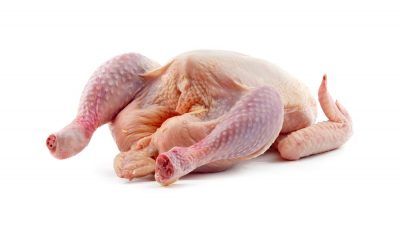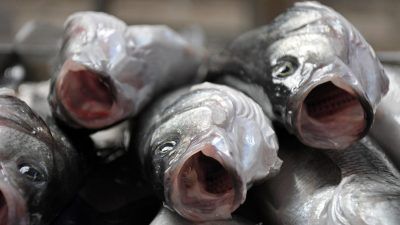8 frightening facts about animal-based foods

We may have just missed Halloween but if you didn’t get your fill of frights, read on to discover eight frightening facts about animal-based foods.
1. Meat causes cancer
In 2015, the World Health Organisation (WHO) classified processed meat as carcinogenic (causing cancer) and red meat as probably carcinogenic. According to their data, just 50 grams of processed meat (less than two slices of bacon) daily increases the risk of bowel cancer by 18 per cent and 100 grams daily of red meat increases the risk of bowel cancer by 17 per cent. They also found links between red meat and pancreatic and prostate cancer, and processed meat and stomach cancer.
Other studies (here, here and here) agree – even small amounts of red and processed meat can increase your risk of bowel, stomach, lung, kidney, bladder, pancreatic, thyroid, breast and prostate cancer. One of these studies highlighted that while meat increases the risk of cancer, it doesn’t offer any benefits.
2. Animal fat contributes to cardiovascular disease
Cardiovascular disease is caused by the buildup of fatty deposits in our arteries, known as atherosclerosis. This can block the flow of oxygen-rich blood to both the heart and brain (as well as other organs), leading to a heart attack or stroke, respectively.
When a scientific team fed volunteers a diet high in red meat, then white meat and then no meat to compare the effects on cholesterol, their results were clear – both red and white meat increased their cholesterol levels, but the meat-free diet did not. The study also tested the effect of additional saturated fat – they added high-fat dairy products and butter to the participants’ diet – and found that it also increased cholesterol levels in all groups.
A Cochrane Review, highly respected by scientists, analysed 48 studies including over 65,000 participants and found that reducing saturated animal fat intake reduced the risk of heart attack and stroke by 14 per cent. Researchers from the Harvard School of Public Health studied the relationship between meat and the risk of heart disease and stroke. They examined 20 studies from 10 different countries and found a much higher risk among people consuming the most processed meat. Meanwhile, in Europe, the extensive EPIC study revealed that people consuming more than 160 grams of processed meat daily have a 28 per cent increased risk of dying from heart disease compared to people eating hardly any.
3. Saturated fat increases the risk of type 2 diabetes
Many people think that eating too much sugar causes type 2 diabetes but it’s not that simple. Several studies (here, here and here) demonstrate that diets high in meat, fat and processed foods drive your body to store fat in your muscle and liver cells. When there’s too much fat inside a cell, it stops being able to work properly and doesn’t react to insulin correctly – resulting in insulin resistance. When we store too much fat in our liver (non-alcoholic fatty liver disease), we directly raise the risk of developing type 2 diabetes.
A large study of vegetarians and meat-eaters in the US showed that eating just one serving of meat per week significantly increased the risk of diabetes – by up to 74 per cent. Many other studies have examined the relationship between meat and type 2 diabetes and found that consumption of red meat increases the risk by 12 to 43 per cent, while processed meat increases the risk by 19 to 57 per cent (references here).
One of these studies that found a connection between type 2 diabetes and red meat, processed meat and poultry listed the many components of meat that can contribute to the problem: saturated fats, animal protein, haem iron, sodium, nitrites and nitrosamines (used as preservatives) as well as other harmful substances.
4. The more meat you eat, the more likely you are to be overweight
Obesity (officially recognised as a BMI exceeding 30) puts you at an increased risk for heart disease, high blood pressure, diabetes, arthritis, gallstones and some cancers. Being obese also weakens the immune system and so increases the recovery time after an illness or injury.
A large study looked at meat consumption and weight among US adults and found that those who ate the most meat were around 27 per cent more likely to be obese and 33 per cent more likely to have central (around the waist) obesity compared to those eating the least. Another study brought similar results – people who ate the most red and processed meat were 37 per cent more likely to be obese than people who ate the least.
An extensive European study also found this link – meat consumption went hand-in-hand with weight gain. Interestingly, the scientists discovered that eating 250 grams of meat daily would make you gain around half a kilogram more weight per year than eating the same number of calories from different foods. A few years later, data from 170 different countries revealed that meat intake was directly linked to excess weight. In fact, meat turned out to be as bad as sugar for weight gain.

5. Milk is a harmful cocktail of hormones
In a typical glass of milk there are 35 hormones. These include sex and growth hormones driving a calf’s development but, in adult humans, they have been linked to the development of cancer – including breast and prostate. What’s more, studies show that mothers drinking cow’s milk have larger babies, children consuming it grow faster, young milk-drinking people have more acne, and high milk intake is also thought to play a role in type 2 diabetes.
Drinking cow’s milk not only delivers growth hormones into your body, it also increases your own body’s production of them. A recent study investigated milk intake in adults and how it affects one of these hormones (IGF-1) and found that milk-drinking significantly increases its levels. On the other hand, vegans have lower levels of IGF-1. One study found that vegan women had 13 per cent lower levels of IGF-1, while another found that IGF-1 levels in vegan men were nine per cent lower. This difference was considered enough to significantly lower the risk of prostate cancer. Got milk? Make mine soya!
6. Meat may cause gout attacks
Gout is a painful condition which affects the joints and it has characteristic flare-ups called gout attacks. It develops when uric acid crystals accumulate in the joints, causing chronic inflammation and irritation. High levels of uric acid in the body have also been linked to kidney and heart disease – particularly to sudden events, such as heart attack or stroke, heart failure and atrial fibrillation (irregular heartbeat).
Your body produces uric acid when it breaks down purines — compounds found naturally in your body but also in many foods. The richest sources of purines by far are red meat and organ meats, such as liver or kidneys, and fish, such as anchovies, sardines, trout, tuna, mussels and scallops. As one review neatly summarised, seafood, red meat, alcohol and fructose increase the risk, while soya and other pulses (peas, beans, lentils) and coffee lower the risk.
7. Animal farming and the rise of superbugs
Factory farms are the ideal breeding grounds for deadly bacteria that are constantly evolving. Farmers know this and it’s why they use antibiotics not just to treat sick animals but also to prevent the spread of diseases.
Shockingly, it’s estimated that worldwide, around 70 per cent of all antibiotics are used on livestock. This massive use of antibiotics has a dangerous side-effect – bacteria develop antibiotic-resistance. It means that if you’re infected by antibiotic-resistant bacteria, your illness will be difficult or even impossible to treat with the medicines we have and could end up being fatal.
Once bacteria develop antibiotic-resistance, they are difficult to control and can cause serious health issues, such as life-threatening sepsis. It develops when harmful bacteria get into the blood and do not respond to antibiotic treatment. Globally, 11 million people die from sepsis every year, and 48,000 in the UK. That’s five people dying from sepsis every hour in the UK and the numbers are rising!
AMR is an urgent global public health threat, killing at least 1.27 million people worldwide, which is included in the almost five million deaths associated with AMR in 2019. The number of people dying from AMR infections could rise to 10 million a year by 2050 if no action is taken to curb the overuse of antibiotics.
8. The next deadly pandemic could come from pigs or chickens
Scientists have been warning us for years that the next pandemic could come from a factory farm, and it could be much more deadly than Covid-19. Avian influenza (bird flu) viruses are among the most dangerous viruses that can affect humans, with a case fatality rate ranging from around 30 to 60 per cent. Other scientists are more concerned with the emergence of a deadly swine flu, because pigs are susceptible to infection with flu viruses from other pigs, humans and birds. The H1N1 virus responsible for the 2009 swine flu pandemic was of swine origin. It had an unusual mix of genetic sequences from birds, humans and pigs. This came about following the mixing of live pigs through international trade, creating the ideal conditions for different viruses to mix with devastating consequences.
Writing in Nature, science writer Willyard warns: “Modern farms are particularly vulnerable to devastation from influenza. A large farm might hold tens of thousands of chickens or thousands of pigs in the name of efficient protein production, and this creates an opportunity for viruses such as influenza to mutate and spread. But there is an even greater fear: that these ever-changing viruses will give rise to the next human pandemic.”
While many health horrors are linked to the consumption of animal-based foods, the opposite is true of a healthy vegan diet. Following this type of diet has the power to reduce your risk of cardiovascular disease, lower blood pressure and cholesterol, reverse type 2 diabetes and help you maintain a healthy weight. And, of course, a vegan diet greatly reduces your impact on the planet and the suffering caused to animals.
Find out more here: Why animal products harm, and here: Factory Farms – a breeding ground for disease, the pandemic threat of animal agriculture.







